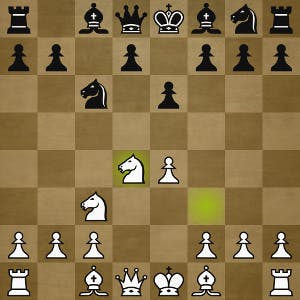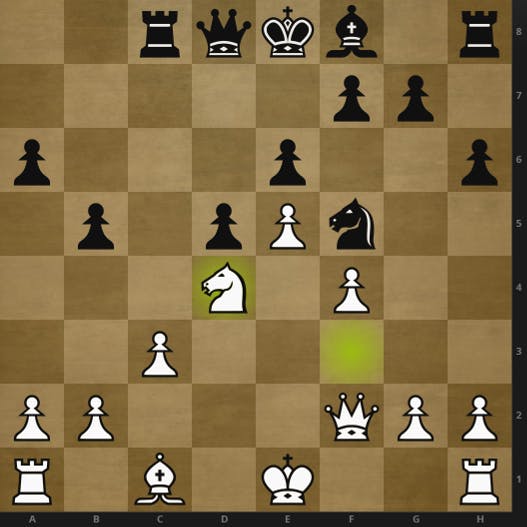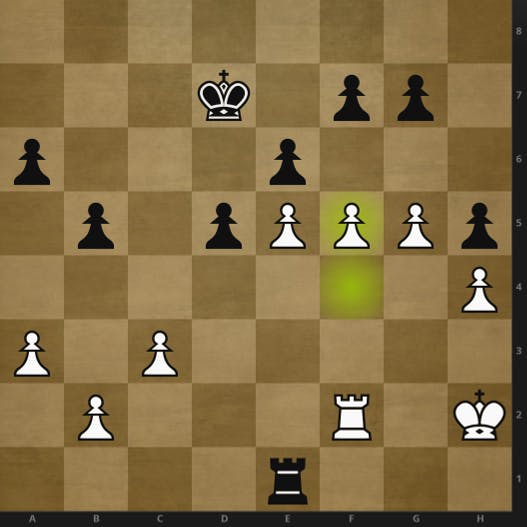How to learn from your games at lichess
A chess article about a typical lichess game

Today, we are delighted to introduce a new lichess blogger, MoralIntentions. You probably already know him for his helpful forum posts, his thousands of lichess games, and of course the amazing chess alphabet!
You can learn more from certain games than from others. That's why I've looked for a typical lichess game that many players can learn from. I will discuss the game between Geol020 and german11, that can be found at //lichess.org/BYlUzns8.
It's an interesting game between two of the most active players on lichess. It's not a game between two of the best players on lichess because I want to discuss a typical lichess game instead of an exemplary lichess game. We all make mistakes and we can learn from the mistakes we make ourselves as well as the mistakes others make. To find a game that we can learn a lot from I've looked for a standard rated game which ended in a mate after more than 40 moves (in the last 6 months) with a time control between 2+0 and 10+0 (I first looked for even faster games because they're really popular on lichess, but most players make big mistakes in those games after less than 15 moves, so we can't learn as much from those).
The game
It's a 5+0 game between Geol020 and german11 that was played on 03/26/2014 in the Harmon Arena (a tournament with a duration of 60 minutes which was created by Intellect01 and won by MacHenry). So far Geol020 has played more than 28000 games on lichess whereas german11 has played more than 38000 games on lichess. They've now played 198 games against each other. The game starts with the Sicilian Defense, French Variation. Both the Sicilian Defense and the French Defense are very popular openings, so many players have once considered combining the two (it has been played in millions of chess games).
1. e4 c5 2. Nf3 e6 3. Nc3 Nc6 4. d4 cxd4 5. Nxd4 These are good moves. 5... Nxd4 This exchange isn't helpful, and aids the development of the opponent's pieces. 6. Qxd4 a6 7. e5 Normally g3, f4, Be3, or Be2 is played here. E5 more often becomes a weakness for white than a threat for black. 7... b5 This way Ne4 can make d6 weak and a4 can create other weaknesses, it's better to play d5 (or Ne7 so you can play Nf5 after Ne4). 8. Bd3 d6 White missed an opportunity, but d6 doesn't prevent Ne4 (f5, d5, and Ne7 look interesting). 9. f4 This looks okay, but it actually blocks some white pieces and gives black the opportunity to use some strong diagonals, Ne4 and a4 were still the moves to look at. 9... Bb7 10. Be4 Bxe4 Black could've played d5. 11. Nxe4 d5 12. Ng5 h6 13. Nf3 Ne7 14. c3 Nf5 15. Qf2 White could've played this one move earlier to prepare for Nf5. 15... Rc8 16. Nd4 It's better to play 0-0, Bc5, and Nd4 because Nxd4, cxd4, Bb4+, Bd2, and Rc2 now has to be avoided by white.

16... Bc5 17. Be3 Nxd4 White would've had a weaker structure after Nxe3. 18. Bxd4 Bxd4 19. Qxd4 Rc4 It looked like a normal move, but cxd4 would've been better because it would've made the position very equal while black now gets the initiative and the opportunity to play d4 later on. 20. Qe3 That should've been Qd2, black can now play Re4. 20... Qa5 21. 0-0 Re4 It is better to first play 0-0 and/or Qc7 because white can now play Qc5. 22. Qf3 0-0 23. a3 Qb6+ 24. Kh1 Re3 25. Qf2 Rc8 26. Rae1 The last two moves haven't been great from both sides, but it's difficult to see that those moves after a couple of more moves can squander the initiative. 26... Rxe1 27. Qxe1 Rc4 28. h3 Re4 29. Qf2 Qxf2 30. Rxf2 Re1+ 31. Kh2 Kf8 A shorter route for your king could've been created with g5. 32. g4 You can't play g3 after g5 now. 32... Ke7 33. h4 Kd7 34. g5 h5 35. f5 This creates an overburdened white rook.

35... exf5 36. Rxf5 Re2+ 37. Kg3 Rxb2 Black could've won with Ke6. 38. Rxf7+ Ke6 39. Rxg7 Kxe5 40. Rh7 Rb3 41. Rxh5 Rxc3+ 42. Kg2 Kf5 43. Rh6 Rc2+ 44. Kf3 Rc3+ 45. Kf2 a5 46. g6 Kf6 47. h5 Tc7 48. Kg3 b4 49. axb4 axb4 50. Th8 b3 51. Kf4 Rb7 52. Rf8+ Kg7 53. Rd8 b2 The last 15 moves were all near-perfect, an incredible achievement. That's why it almost physically hurts to see move 53. Not because they are stupid mistakes (many players would've played Rd8 and b2), but because there were many pitfalls in the previous moves and it would've been amazing if both players would've avoided these as well. 54. Kg5 b1=Q 55. h6# A beautiful mate and a very interesting game. After 53. Rd8 black could've played d4 so Kg5 can be met by Rb5+. That would've been winning, but not easy. If white had played 53. Re8 (or Ra8 or Rc8) then 53... d4 54. Re1 b2 55. Rb1 Kh6 56. Ke4 Kxh5 57. g7 Rxg7 58. Rxb2 Rd7 59. Rd2 d3 60. Rxd3 Rxd3 61. Kxd3 could've happened.
How to learn from the game
Games with endgames are often amazing (as long as the players don't play on time too much). You can use engines and endgame tablebases to find mistakes. However it's better to investigate the position for yourself initially (even before you request a computer analysis on lichess), you learn more by first looking for mistakes yourself (and preferably also discussing the game with your opponent). The most important mistakes aren't always the moves where the evaluation changes dramatically and the best moves aren't always the moves where the evaluation doesn't change at all. You shouldn't only look for the best theoretical move, but also for good practical chances. Sometimes not having a plan for several moves is a more important point of interest than a difficult to spot blunder you made. Also, don't only ask yourself what you still have to learn, ask yourself what you have to unlearn as well. Another thing to look for is if the (almost equal) positions you were in are favourable for your style of play. Try to find the strengths and weaknesses of every move and every plan (you can quickly look through many games, but quality is often more important than quantity to get better at chess). Many more things can be said about learning from games. Please ask questions about it below this article so people (including me) can answer them. You can use examples from this game to make clear what you're asking.
What to learn next
This was my first chess article on lichess. Please let me know (below) what I can write about in other chess articles on lichess. I will consider all suggestions. Try to choose a topic which you think many players can benefit from, which is specific enough that much of it can be covered in one article, which can't easily be found online, and which you really find interesting. You can also suggest other things than the topic. I hope you found this article interesting and that you learn something from the chess articles I write (this one and future ones).